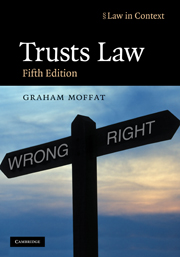Book contents
- Frontmatter
- Contents
- Preface to the fifth edition
- Acknowledgments
- Table of abbreviations
- Useful websites
- Table of statutes
- Table of statutory instruments
- Table of cases
- 1 Trusts introduced
- 2 The evolution of the private express trust
- 3 Taxation, wealth-holding and the private trust
- 4 Creating the trust – I
- 5 Creating the trust – II
- 6 Trusts and public policy
- 7 Flexibility in relation to beneficial entitlement
- 8 The taxation of private trusts
- 9 An introduction to trustees and trusteeship
- 10 Aspects of the management of trusts
- 11 Trusteeship, control and breach of trust
- 12 Implied trusts and the family home
- 13 Trusts in commerce I: occupational pension schemes
- 14 Trusts in commerce II: commerce and equitable remedies
- 15 Trusts in commerce III: commerce, credit and the trust
- 16 Trusts in commerce IV: fiduciary relationships, commerce and the trust
- 17 Trust, contract and unincorporated associations
- 18 An introduction to the law of charity
- 19 A legal definition of ‘charity’
- 20 The regulation of charities
- Index
19 - A legal definition of ‘charity’
- Frontmatter
- Contents
- Preface to the fifth edition
- Acknowledgments
- Table of abbreviations
- Useful websites
- Table of statutes
- Table of statutory instruments
- Table of cases
- 1 Trusts introduced
- 2 The evolution of the private express trust
- 3 Taxation, wealth-holding and the private trust
- 4 Creating the trust – I
- 5 Creating the trust – II
- 6 Trusts and public policy
- 7 Flexibility in relation to beneficial entitlement
- 8 The taxation of private trusts
- 9 An introduction to trustees and trusteeship
- 10 Aspects of the management of trusts
- 11 Trusteeship, control and breach of trust
- 12 Implied trusts and the family home
- 13 Trusts in commerce I: occupational pension schemes
- 14 Trusts in commerce II: commerce and equitable remedies
- 15 Trusts in commerce III: commerce, credit and the trust
- 16 Trusts in commerce IV: fiduciary relationships, commerce and the trust
- 17 Trust, contract and unincorporated associations
- 18 An introduction to the law of charity
- 19 A legal definition of ‘charity’
- 20 The regulation of charities
- Index
Summary
Introduction
An agenda for change
In the previous chapter we observed that the nineteenth century had handed on a definition of charity based on the preamble to the Statute of Charitable Uses 1601 but encrusted with a luxuriant growth of case law. Despite several official and unofficial proposals during the twentieth century to reform and/or clarify the definition the legislature had until recently taken no major steps in this direction (see Colwyn Commission (Cmd 615, 1920) Pt III, s xiv; Nathan Report (Cmd 8710, 1952) paras 123–140; Report of the Radcliffe Commission on the Taxation of Profits and Income (Cmd 9474, 1955) ch 7; Goodman Committee Report Charity Law and Voluntary Organisations (1976) para 23 and App I). There had been an obvious opportunity for reform at the time of the Charities Act 1960 but this statute, while repealing the 1601 preamble, left the definition itself untouched. The matter appeared to have been settled by the Conservative government in its 1989 review of the regulatory framework provided by charity law (Charities: A Framework For the Future (Cm 694, 1989). The opinion expressed in the Review was that any reformulation or attempt to give the definition statutory effect was undesirable: ‘There would appear to be few advantages in attempting a wholesale redefinition of charitable status – and many real dangers in doing so’ (para 2.17).
- Type
- Chapter
- Information
- Trusts LawText and Materials, pp. 964 - 1035Publisher: Cambridge University PressPrint publication year: 2009



